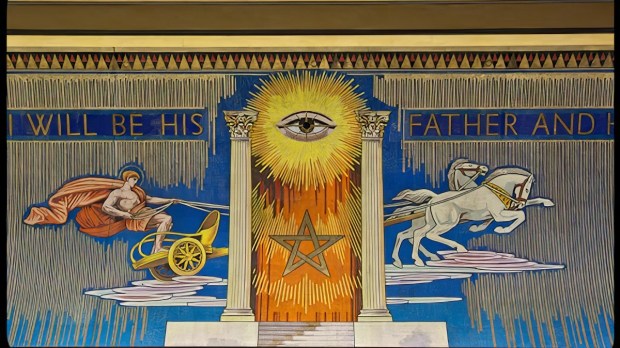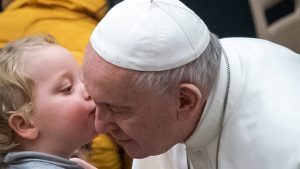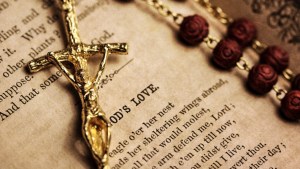“Don’t get me wrong. I love Catholics,” he said. People like Jim Nations always do, even when they’re claiming that the Church those Catholics love is malevolent and mendacious. Despite all the gains in friendship between divided Christians, the outer fringes of conservative Protestantism include some people who think the Catholic Church is a Big Bad Really Devious Wicked Thing in league with Other Forces of Darkness.
For example, Jim Nations, who makes sure you know he loves Catholics and the television show that features him. Reports Bob Sullivan, writing in Catholic Answers: Nations, a colleague of televangelist Jimmy Swaggart, tells a church group that “the Jesuits invented the Freemasons as a fake Christian secret society, in an effort to reverse the reformation and create a ‘One World Order.’” As Nations himself put it on the Swaggart show’s website: he explains “how Freemasonry, Islam and the Roman Catholic Church connected and were now working together toward a New World Order which is spoken of in Revelation Chapter 13 & 17.”
Distorted views of Catholicism
You may be thinking that this man is, as my grandmother used to say, crazy as a bedbug. The Church’s hardest critics among our Evangelical brethren will say that she is corrupt, unbiblical, teaches a false gospel of faith by works, and the like, but it would never occur to them to say the Church is part of a secret conspiracy with Freemasons and Muslims.
This kind of thing — the Nations/Swaggert view of Catholicism — is certainly a byway in American Christianity with little effect on anyone else. There aren’t a lot of people like this, but there are more of them than you might think and, most importantly, they represent the pure version of beliefs some other Evangelicals, people with whom we may work, have in diluted form.
Some years ago when I was still an Episcopalian, I was talking with a new friend, a conservative Presbyterian. We were lamenting the barriers to improved relations between divided Christians, and I made fun of some book that claimed tunnels ran between the Vatican and nearby convents so that priests and nuns could have orgies hidden from the world. My new friend said quite seriously, “Well, that’s true.” Not “was true,” but “is true.” I said it wasn’t, he said it was. He was not to be dissuaded. He turned out to believe a lot of stories like that one.
Bias flourishes in isolation
Since becoming a Catholic, I’ve had conversations that were going along swimmingly when the other person let drop some old anti-Catholic canard as crude as my new friend’s. Usually unknowingly, too. They seemed to assume a Catholic they can talk with isn’t really a convinced Catholic and will agree with them. My protests surprised them.
But the Church as part of a secret Freemason/Muslim/Catholic alliance, this goes several steps beyond the usual prejudice. The usual explanations for extremism must apply to this group: cultural marginalization, economic vulnerability, the creation of social cohesion through scapegoating, fear of the other, a history of prejudice inherited from the past. It’s also an easy bigotry to indulge, as these people rarely have to engage a Catholic. They can say rude things about Catholics as they might about Martians. Their words will never come back to bite them.
The evolution of suspicion
I think there are at least a couple of other reasons. One is the great attraction of seeing through something, of knowing the real story behind the story everyone else believes. We all know the attraction. It’s one reason we gossip. “Of course everyone thinks he’s a good Christian. But you know, really…” For various reasons, people like Nations lack that alarm that tells them when they’ve crossed the line from plausible explanation into absurdity.
Nations and his peers begin with hostility to the Church. They look at her with a hermeneutic of suspicion. They assume that no matter how the Church acts in public, she’s up to no good. Being the Church of the Borgias and the Jesuits, she’s really good at looking good while being bad. Nations and his peers see (they think) through the Church’s pretensions.
The other reason is the appeal of being in the inner ring of the enlightened. Everyone else may be fooled, but you and your gang, you know what’s really going on. This we also know. The feeling drives many a dinner party conversation.
People like Nations think the real history of the world is happening out of sight. Only those who can connect the few dots that slip into sight and figure out where all the other dots must be will truly understand it. Thus the whole Catholic/Freemason/Muslim conspiracy.
A byway, the Nations/Swaggart view, and crazy, as I say, as a bedbug. Besides perhaps being interesting in itself, the Nations theory of Catholicism’s secret diabolical plans point by contrast to something more hopeful.
Brothers who bicker, but brothers
We all can understand just being snobby or snotty or unkind in another way when speaking of, or even to, people on the other side of the Reformation divide. As a Catholic, I can understand Evangelicals repeating the old prejudicial stereotypes: Catholics don’t read the Bible, they worship Mary, they do bad things because they think confession will make it all right, etc. I trust they will understand when Catholics repeat the old prejudicial stereotypes about Evangelicals: Evangelicals are hicks, fanatics, racists, busybodies, etc.
Not ideal, but like two boys yelling at each other, “You’re ugly!” “No, you’re ugly!” “You’re uglier!” “If my dog had a face like yours…” People on both sides throw out the old insults. “You’re an idolater!” “You’re a fundamentalist!” “Mary-worshipper!” “Snake-handler!”
But they’re the old insults. That’s the important thing. They’re getting worn out, frayed around the edges, long in the tooth. They’re losing their power as Evangelicals and Catholics grow in friendship and the world itself pushes them closer together. The two boys yelling at each other are two brothers. At some point, probably when someone else attacks one of them or both of them, they’ll stop yelling and start acting like brothers.
David Mills, former executive editor of First Things, is a senior editor of The Stream and columnist for several Catholic publications. His last book isDiscovering Mary.



